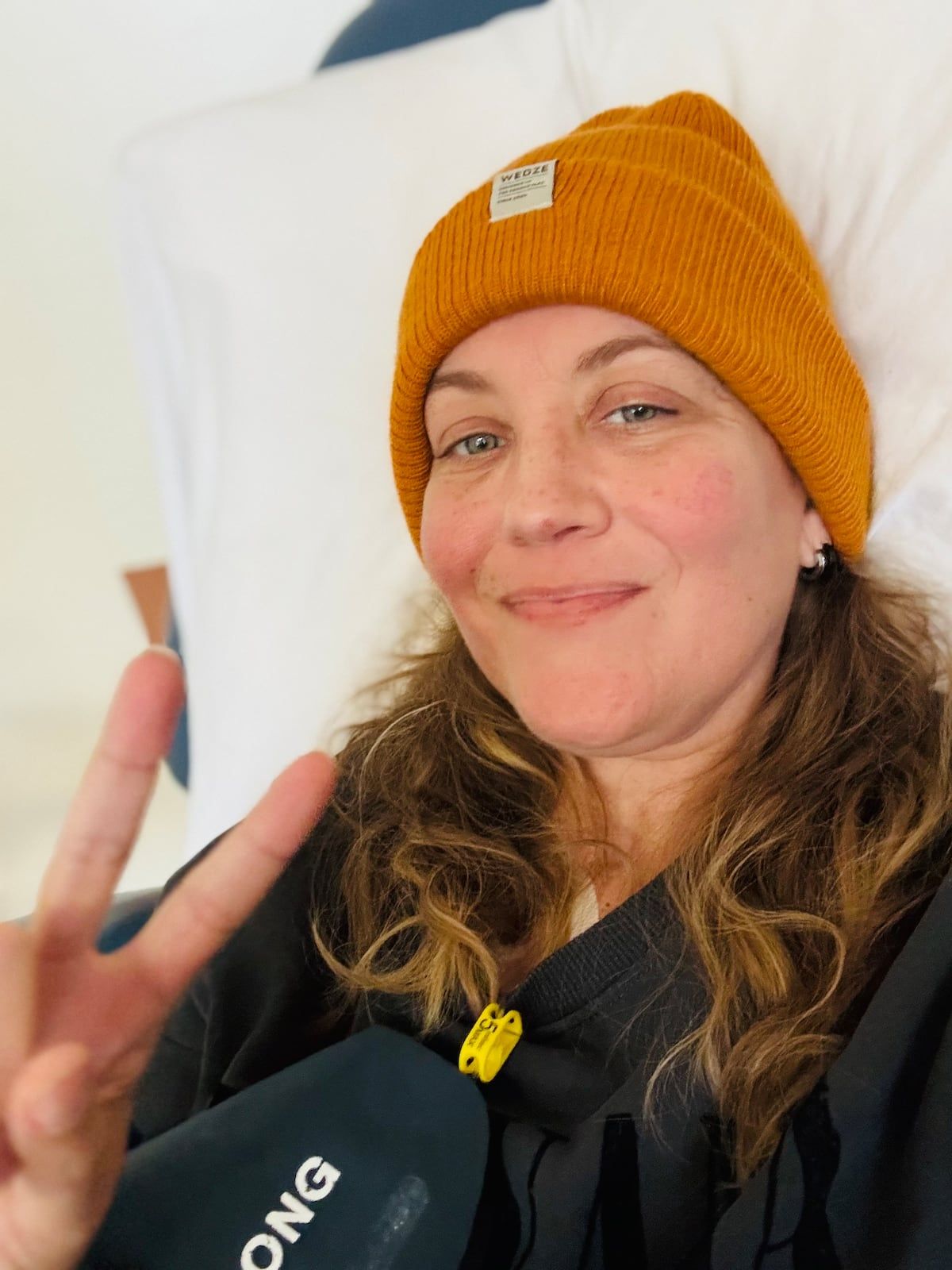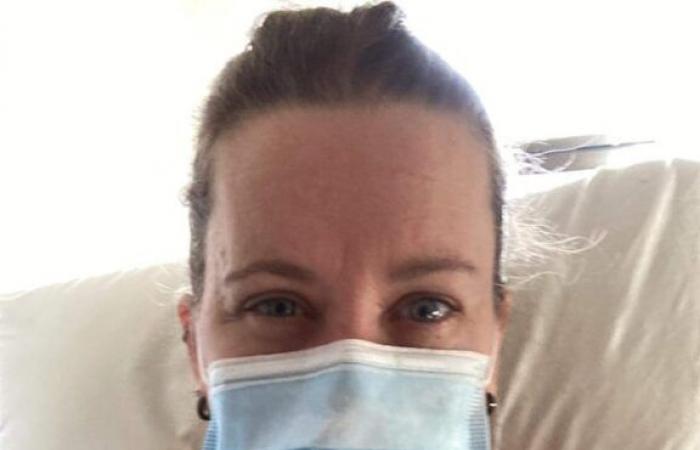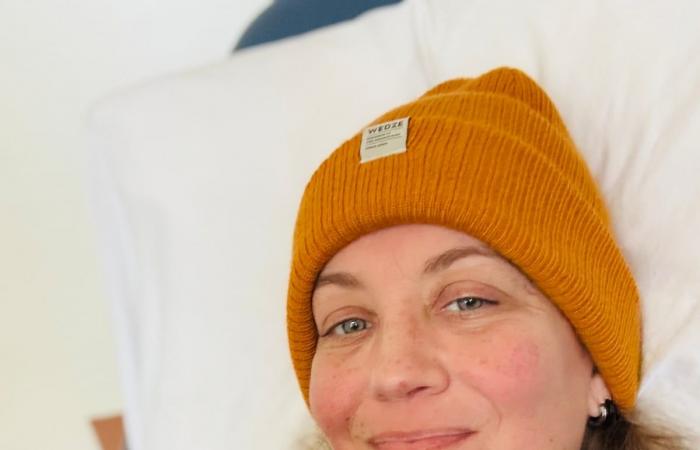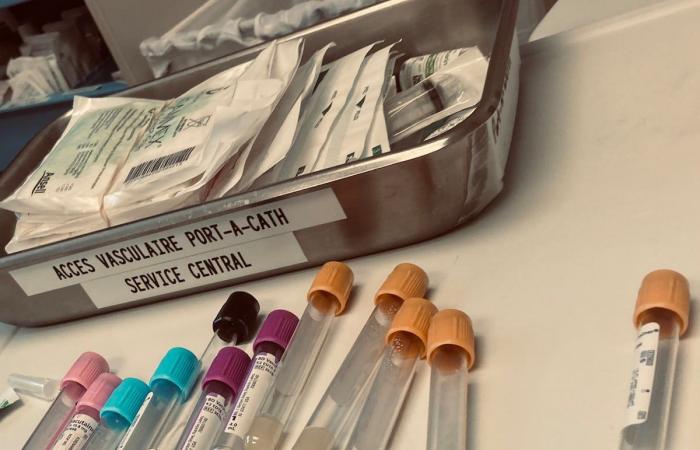“It’s as if the RAMQ had decided that we didn’t have the right to live normally,” says the mother, who has suffered respiratory infection after infection since July and can no longer escape this vicious circle. .
It must be said that her life began rather abruptly, when she had her first pneumonia at just one month old.
Ann Julie Desmeules’ illness begins to weigh on her partner, their four daughters, and their daily lives, her state of health preventing her from doing activities with them. (Ann Julie Desmeules)
Cystic fibrosis, also called cystic fibrosis, is a genetic disease that affects the respiratory and digestive tracts and can be fatal. It would have been in any case for Ann Julie Desmeules, if she had not received a double lung transplant in 2003, when she was 25 years old.
“I’ve been sick all my life. They managed to save me at the last minute with the transplant, but it’s something you carry with you all the time. For meals, I have to take pancreatic enzymes, insulin, I have sinusitis all the time, therefore headaches, fatigue…” she explains.
The medication that could alleviate his symptoms costs $300,000 per year and is not accessible to people who have received a transplant. (Ann Julie Desmeules)
Due to this intervention, she is also immunosuppressed and is therefore vulnerable to the slightest virus that passes. Since July, she has been unable to work and has been receiving intravenous treatments to help manage persistent infections.
She also has to go to the hospital twice a week to undergo bronchial washings and clear her airways. While his grafts show signs of improvement, his sinuses become chronically infected, which infects his lungs and so on. And to make matters worse, she recently contracted COVID-19.
It’s endless.
— Ann Julie Desmeules
This transplant allowed her to achieve goals that she thought were unattainable, such as becoming a mother, building a family, studying, having a career.
But what saved his life several years ago now prevents him from accessing the medication that could relieve his symptoms and significantly improve his daily life and that of his family.
No explanation
“Trikafta completely cures the disease. I have several friends who took it and who fell overnight as “normal” so to speak, it’s truly revolutionary. But as soon as the RAMQ sees the word “grafted”, they do not take your file into consideration. However, my physiotherapist would be ready to give it to me,” says Ann Julie.
This medication, taken twice a day, could reduce his infections, improve his lung capacity, ease his management of diabetes and pancreatic insufficiency, in addition to saving him from numerous hospital visits to microbiology, endocrinology, pulmonology, gastro -enterology and urology.

The RAMQ refuses to provide the drug Trikafta which could improve the daily life of Ann Julie Desmeules, due to the lung transplant she received a few years earlier. (Ann Julie Desmeules)
The situation is all the more difficult to bear as the health insurance authority gives no explanation as to why people who have undergone a transplant cannot access this medication.
According to what the young woman heard, the administration of Trikafta could work against the anti-rejection drugs she is taking for her transplant.
“Others say it’s because there wouldn’t be any significant improvement. But even if there is no significant improvement, can I at least try it? Because I am currently in a cycle where I cannot get out of it,” she claims.
She says that at first, she could understand the RAMQ’s decision, because it is a medication that costs $300,000 per year. “But they grant it to two-year-old children who have no symptoms at this time,” she mentions.

Since July, the Jonquiéroise woman has had to stop working and must go to the hospital at least twice a week to undergo bronchial washings and receive intravenous treatments. (Ann Julie Desmeules)
This situation also weighs on her partner and their four children, since her fatigue and headaches limit her in her activities with them.
“The oldest doesn’t understand why, but I don’t have an explanation to give her. […] I didn’t get a logical explanation from anyone,” she continues.
Letter to Yannick Gagnon
I think I’m a positive person, but it’s starting to get heavy. It would be fun if I could try something else. It’s not like I’m asking for a miracle and it doesn’t exist, no, it’s there.
— Ann Julie Desmeules
To hope to get things moving, the Jonquiéroise sent a letter on November 25 explaining her situation to MP Yannick Gagnon, as well as to Minister Andrée Laforest and to the MP for Dubuc, François Tremblay. Due to the holiday season, she has not had any returns yet.
“I would like us to stop the damage it can do to my body,” she says.









